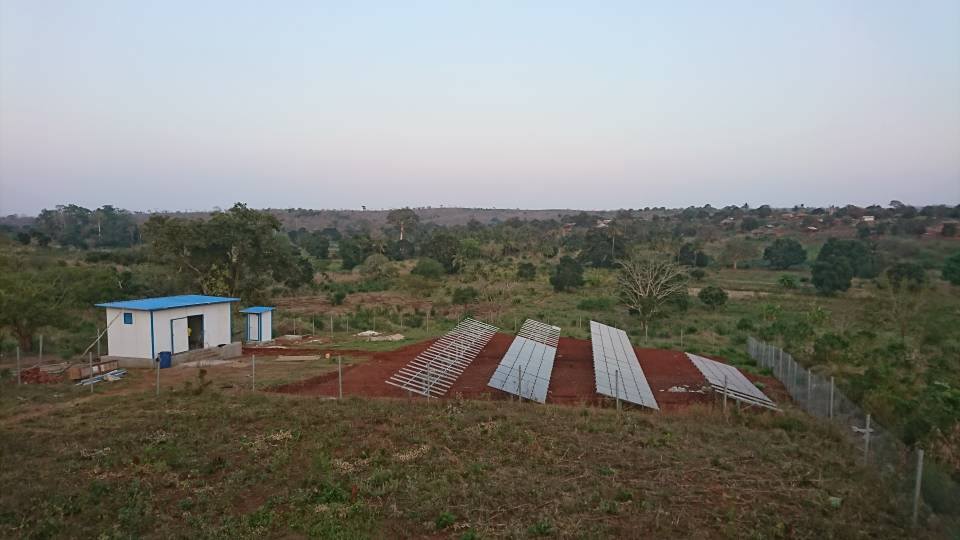Greetings, Agents of Impact!
Call No. 24: Solar financing for frontline health clinics in Africa and Asia. Agents of Impact, it’s time to put on your catalytic caps to think through this compelling challenge for innovative finance. Frontline public health clinics are playing a critical role in the COVID crisis, but the vast majority of health facilities in Africa lack reliable electricity for ventilators, lighting and communication. The World Bank’s Raihan Elahi, Sustainable Energy for All’s Jem Porcaro, UBS’s Phyllis Costanza and Liebreich Associates’ Michael Liebreich join We Care Solar’s Laura Stachel and ImpactAlpha’s David Bank and special guests to explore financing solutions for clean, affordable and reliable solar power for frontline public health clinics, Thursday, Oct. 8, at 9am PT/ 12pm ET/ 7pm Kampala. RSVP today.
Have you returned the subscriber survey? ImpactAlpha’s short survey will help us provide even more value to your subscription. Help us help you. Respond by Thursday, Oct. 15, to win one of five free tickets to this month’s SOCAP Virtual, a $499 value. Take the survey.
Dealflow: Follow the Money
Salesforce stands up its second corporate impact fund at $100 million. Salesforce CEO Marc Benioff is a vocal proponent of ‘stakeholder capitalism’ and the company was a pioneer in corporate impact investing. Now, Salesforce is committing $100 million to a second impact fund inside its corporate venture arm, Salesforce Ventures (see, “SoftBank, Salesforce and Orange signal corporate venture capital’s tilt towards impact investing”). Fund II, like its $50 million predecessor, will invest in cloud computing companies that target climate action, diversity and inclusion, education and reskilling, and nonprofit services – and use Salesforce’s products. “We believe business can be a powerful platform for change,” Salesforce’s Suzanne DiBianca, the firm’s chief impact officer, said in a statement. “Salesforce will invest in companies solving the world’s most pressing social and environmental challenges.”
- Round one. The company’s first impact fund has backed more than 25 companies since 2017, including sustainability startups Bloc Power and Measurabl, education and workforce skills companies Guild and Future Fuel, and economic empowerment startups Ureeka and Juntos. The fund has exited microscholarship company RaiseMe (to CampusLogic), grassroots text-messaging platform Hustle (to Social Capital) and nonprofit fundraising solution foundCorner (to Salesforce.org).
- Corporate impact venturing. Corporations poured a record $58 billion into 3,234 venture deals last year. “By marrying the scope of corporate venture capital and logic of impact investing, a growing field of corporate investors are seeking to generate financial return, strategic value, and impact,” Orange Silicon Valley’s Moses Choi wrote in a widely read ImpactAlpha post earlier this year. Amazon and Microsoft, along with Citi, Merck, Splunk and Unilever have launched efforts to invest with impact-oriented theses.
- Share this post.
FMO backs Husk Power Systems’ minigrid expansion. Husk is a veteran of off-grid energy. The 12-year-old company, once known for biomass energy plants in India’s remote communities, is now a solar minigrid developer in Africa as well. A new commitment of $5 million from FMO, the Dutch development bank, comes two years after a $20 million equity round backed by Shell Technology Ventures, French utility ENGIE’s impact fund and Swedfund International. Husk says it has installed five megawatts of generating capacity and aims to have 30 megawatts of installed capacity in India and Africa within two years.
- Minigrid potential. Solar minigrids have been slow to scale, particularly in the remote areas where Husk operates, because the technology has lacked both durability and affordability for low-income rural customers. Husk says its costs are below $2 a watt for a system that includes a pre-paid meter, which other systems on the market lack. It also differs in that it does not rely on diesel generators as a back-up power system. Last year, Tata Power launched TP Renewable Microgrid in collaboration with the Rockefeller Foundation to build 10,000 minigrids in India by 2026. Tata’s technology partner, the Institute for Transformative Technologies, claims its systems can generate power for roughly half the cost of most other systems on the market, making it affordable to low-income customers earning about $150 per month.
- Strategic pivot. More than 200 million Indians live without access to electricity. Husk got its start in 2008 with biomass-based systems that used rice husks and other agricultural waste to power off-grid communities. When costs for solar technology plummeted, the company pivoted to hybrid biomass-solar systems. “FMO considers minigrids as the key to unlocking a successful rural distributed energy sector,” said FMO’s Keesjan de Kruijf. “Husk’s relentless drive for cost efficiency and customer-centric business model ensures it is able to position itself both competitively and profitably.”
- Check it out.
Jonathan Rose closes $525 million impact fund for affordable housing. The New York-based real estate investor spotted the opportunity in buying, preserving and greening affordable housing earlier than other commercial real estate investors. Jonathan Rose acquires affordable housing properties and upgrades them with energy-saving lights and appliances, other green features, and social and educational services for residents. The growth of impact investing has helped the 31-year-old company grow its assets and its portfolio. “There is an increased interest in investing in affordable housing, as investors have become familiar with the steadiness of the cash flows, and the excellent historical returns,” founder Jonathan Rose told ImpactAlpha. “They also see it as a way to directly address social inequities.”
- Institutional investors. Its fifth fund is backed by the Ford Foundation and The Sorenson Impact Foundation, as well as unnamed pension funds, foundations, universities, family offices, high net-worth investors and healthcare systems, which are responding to a growing number of studies that “correlate health and aspects of housing,” said Rose.
- More.
Malomo raises $2.7 million to help small businesses expand online marketing. The Indianapolis-based startup helps businesses engage customers as they track orders through the Shopify e-commerce platform. The intent is to help small businesses boost their online marketing and brand visibility. Harlem Capital, San Francisco-based Base 10, Hyde Park and High Alpha backed the Black-led startup’s funding round.
- Family tribute. Malomo means “flowers” in Swahili. Founder Yaw Aning named the company in honor of his mother, who owned a small soap-making business of that name.
- Read on.
Signals: Ahead of the Curve
Will the public bear the cost of the oil industry’s unfunded liabilities? ExxonMobil was eclipsed last week by solar and wind producer NextEra Energy, which briefly became the largest U.S. energy company by market value. Exxon’s value has dropped by more than half this year, underlining “the multi-year shift from traditional toward renewable energy,” UBS’s Mark Haefele said. But oil is still exacting a price from U.S. taxpayers, who could be saddled with more than $280 billion when oil and gas wells are decommissioned or abandoned. In “Billion Dollar Orphans,” CarbonTracker documents the scale of such unfunded liabilities. Texas alone faces up to $117 billion in cleanup costs. “If this is coming to an end, we need to do some smart thinking about what comes next,” CarbonTracker’s Robert Schuwerk told ImpactAlpha.
- Socialized risks. The surety bonds oil and gas companies are required to obtain cover just 1% of the potential costs, Schuwerk says. The report tallies the cost of closing 2.6 million known wells. Not included: an estimated 1.2 million undocumented wells. “There is work to be done to restore the land that these wells are built on, but no money set aside for it,” Schuwerk says.
- End game. The ability to escape future liabilities encourages producers to drill new wells, and leave idle ones unplugged, even as the COVID crisis has accelerated a shift to low-carbon energy. Most at risk: U.S. shale producers. More than three dozen have filed for bankruptcy in the first eight months of this year. North Dakota is financing an effort to put hundreds of oilfield workers back to work plugging abandoned wells and reclaiming land with CARES Act relief funds, as well as bonds seized from oil operators.
- Adverse agenda. Exxon plans to invest $210 billion into projects that will increase its carbon emissions by 17% over a seven-year period, reports Bloomberg. Actual emissions are five times greater when car emissions and other downstream uses are included. Not a single oil major has vowed to stop greenlighting new extraction projects, according to Oil Change International. “If oil and gas companies were serious about the Paris Agreement, they would end new oil and gas exploration and extraction now,” the group says, “and phase out production from existing developed reserves.”
- More.
Agents of Impact: Follow the Talent
Generation Investment Management is hiring a growth equity associate in London… Prime Impact Fund is looking for an intern for investment operations in Cambridge, Mass… ImpactAlpha’s Dennis Price is moderating “In Search of Impact Alpha in Listed Equities,” an impak panel featuring Harvard Business School’s Rob Zochowski, HEC Paris Augustin Landier and impak’s Boris Couteaux, tomorrow, Oct. 7, at 12pm ET… REFI Global’s “ESG Virtual Summit” will explore ESG strategies in commercial real estate with Jim Landau of MetLife Investment Management, RICS Germany’s Susanne Eickermann-Riepe, Anne Johnstone of Fair Futures Partnership, and REFI Global‘s Roodgally Senatus on Wednesday, Oct. 28.
Thank you for reading.
–Oct. 6, 2020











